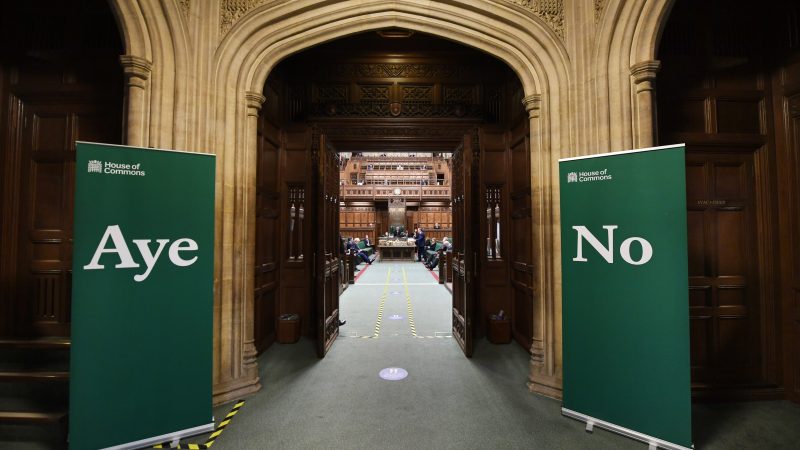
Labour has voted against the controversial overseas operations bill as MPs in the Commons passed the legislation by a majority of 85, with 345 voting in favour of the bill and 260 against.
Addressing MPs during the debate this evening, Labour’s John Healey raised a number of problems with the bill that makes provisions for legal proceedings in connection with operations of the armed forces overseas.
He said the bill “does not do what it says on the tin”, highlighting that it fails to deal with “baseless investigations”, breaches the armed forces covenant and “does more to protect the Ministry of Defence than it does armed forces personnel”.
The Shadow Defence Secretary argued in parliament tonight: “Ministers are in denial about the flaws in this bill and with the arrogance of an 80-seat majority they dismiss those who argue for amendments as disingenuous…
“We want our troops to be better protected, we want our British military to be held in the highest regard around the world, we want our British justice system to set standards that others follow. And it’s because we passionately believe in these values that we cannot accept this bill as it stands.”
The Conservatives pledged in the 2019 general election to tackle “vexatious claims” against armed forces personnel, such as those raised regarding the conduct of British troops during the Iraq war or Northern Ireland operations.
Healey added: “We all want to protect British troops and British values… It is simply wrong to make debate on this bill divisive or to brand those who challenge ministers on the contents of this bill as somehow standing against British troops.”
Tory Defence Secretary Ben Wallace had used his contribution to criticise the last Labour government and former ministers on the backbenches this evening for their record on protecting soldiers from vexatious claims.
Healey told MPs that there has been a “long-running problem with baseless allegations and legal claims arising from Iraq and from Afghanistan under both Labour and Conservative governments. But this bill as it stands is not the solution”.
The government has seen cross-party resistance to the legislation, with Labour MP Dan Jarvis and Tory backbencher David Davis declaring in a joint piece in The Times that “blocking torture investigations will damage the army’s standing”. Davis and Tory Anne Marie Morris MP voted against the bill tonight.
Jarvis told the Commons this afternoon: “There is no debate on what constitutes torture. Nor can an act of torture be conducted in error or as the result of a split-second misjudgement. It is a premeditated action…
“By not excluding torture on the face of this bill, the government is I believe taking another step backwards on international law and on human rights.”
The legislation proposes a ‘presumption against prosecution’ of service personnel accused of committing a crime overseas, with the exception of sexual offences, if more than five years have passed since the alleged offence took place.
Former Labour defence minister and current Labour backbencher Kevan Jones brought an amendment that would have introduced judicial oversight of historic investigations of armed forces personnel.
Jones said this evening: “This bill will do nothing to protect veterans. They will still be investigated. They will still be prosecuted… and their basic right under section 33 of the Limitations Act will be taken away from them. That is shameful.”
Labour has criticised the bill repeatedly from removing protections for armed forces personnel by including provisions that would restrict the time allowed for soldiers to bring claims against the Ministry of Defence.
MPs voted down Labour’s new clause five, which would have amended the bill to explicitly excludes actions brought against the Crown by serving or former service personnel from the limitations on courts’ discretion, by 266 votes to 366.
The Commons also voted down an amendment from David Davis MP, which would have meant the provisions to block prosecutions would not have applied to torture and related offences under the Criminal Justice Act, by 334 votes to 269.
Labour slammed the proposed legislation during the second reading debate, saying that the bill “creates the risk that the very gravest crimes including torture and other war crimes go unpunished”. But the party abstained from the vote.
18 Labour MPs did vote against at the time: Diane Abbott, Apsana Begum, Olivia Blake, Richard Burgon, Ian Byrne, Jeremy Corbyn, Ian Lavery, Rebecca Long-Bailey, John McDonnell, Kate Osamor, Kate Osborne, Bell Ribeiro-Addy, Lloyd Russell-Moyle, Zarah Sultana, Jon Trickett, Claudia Webbe, Nadia Whittome and Beth Winter.
Former shadow immigration minister Bell Ribeiro-Addy tabled an amendment to throw out the bill at its second reading. She argued on LabourList: “There’s nothing remotely patriotic about rejecting international law and decriminalising torture.”
The legislation has now completed all stages in the Commons. The bill will now proceed to the House of Lords before it can return to the lower chamber again for MPs to consider amendments made by the Lords.




More from LabourList
‘Labour must confront the crisis of first past the post before it’s too late’
Unite to debate affiliation with Labour Party at conference next year
Miliband tops LabourList Cabinet league table, with gender divide in PM approval